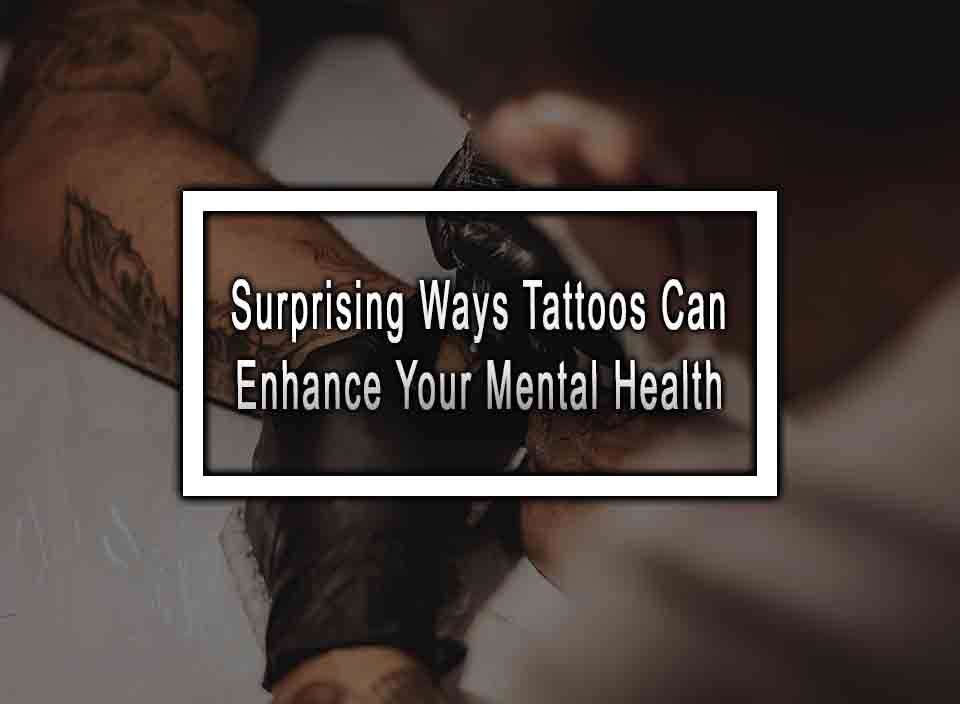Table of Contents
ToggleInk Your Way to Better Mental Health: A Surprising Connection.
It’s time to bust some myths and spread the word: tattoos aren’t just about self-expression or aesthetics; they might be secret weapons for boosting your mental health. More and more, people are discovering the unseen yet powerful benefits of getting inked. Intrigued? Allow us to shed light on the matter!
1. Tattoos as a Form of Self-Expression
Tattoos have long been considered a form of self-expression. By choosing a design that speaks to your personal story or passions, you nurture your mental health by affirming your unique identity. It’s a visible manifestation of inner strength and growth.
2. Tattoos and The Therapeutic ‘Pain’
The process of getting a tattoo can be seen as a ritual where the physical pain can lead to psychological healing. This can be especially empowering for individuals who have experienced trauma or emotional pain.
3. Tattoos as a Physical Reminder of Overcoming Challenges
Having permanent symbols on your body can serve as potent reminders of overcoming personal challenges, promoting resilience, and bolstering self-esteem. Such tattoos can reinforce recovery from mental health issues such as depression or addiction.
4. Tattoos Boost Self-Confidence
A well thought out tattoo that resonates with you can help boost your self-confidence. The realization that your body is yours to decorate and love can enhance your self-esteem.
5. Tattoos Can Foster a Sense of Belonging
Sometimes, tattoos are a sign of shared identity or camaraderie. They can give a sense of belonging to a group or community, which is vital in combating feelings of isolation and promoting mental well-being.
Conclusion
So, there you have it. Tattoos aren’t just physical art forms; they’re also tools for personal empowerment and mental healing. This perspective on tattoos offers a refreshing reminder that even the most unexpected things can lead to better mental health. And remember, your tattoo journey should always be a reflection of your unique experience, strength, and hope. Keep it personal. Keep it real. And yes, keep it inked!
While tattoos have several potential mental health benefits, it’s essential to remind all our readers that getting inked is a personal choice, and what works for one person, may not benefit another. Always triple check that your tattoo decision aligns with your personal values, mental health needs, and aesthetic preferences. Moreover, it is not a replacement for professional mental health support or therapy. If you’re struggling with mental health issues, please seek help from health care professionals. Your well-being matters most!
Tattoos FAQ
Here are the most common questions about Tattoos.
1. How long does a tattoo take to heal?
The healing process for a tattoo varies for each individual, but it typically takes about 2-3 weeks for the outer layer of the skin to heal. However, it may take several months for the tattoo to fully settle and for the skin to regain its normal texture.
2. Does getting a tattoo hurt?
Yes, getting a tattoo can be painful as needles are used to pierce the skin and deposit ink. The level of pain varies depending on the individual, the location of the tattoo, and their pain tolerance.
3. How much does a tattoo cost?
The cost of a tattoo varies depending on factors such as size, complexity, location, and the experience level of the tattoo artist. Smaller tattoos can range from $50 to $200, while larger and more intricate designs can cost several hundred or even thousands of dollars.
4. Can I remove a tattoo?
Yes, tattoos can be removed through various methods such as laser tattoo removal, dermabrasion, or surgical excision. However, these procedures can be expensive, time-consuming, and may not completely remove the tattoo, leaving behind permanent scarring.
5. Can pregnant women get tattoos?
It’s generally advised that pregnant women avoid getting tattoos. The risk of infection, the impact of stress on the body, and the uncertain effects of inks on the fetus are reasons commonly cited for this recommendation.
6. Are tattoos safe?
When done by a professional and licensed tattoo artist, tattoos are generally considered safe. However, there are risks associated with the process, such as infection, allergic reactions, and scarring. It’s important to choose a reputable tattoo artist who follows proper hygiene and sterilization practices to minimize these risks.












